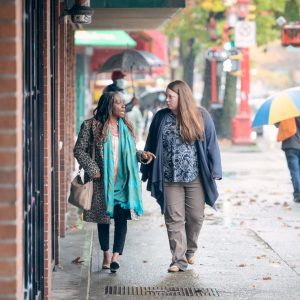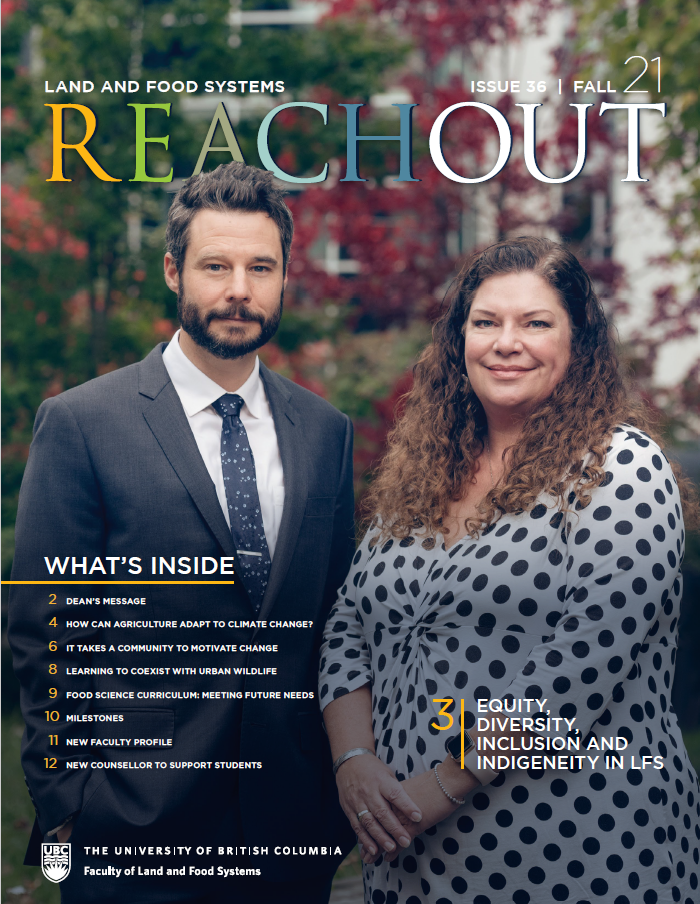It Takes a Community to Motivate Change
Community partnerships make a world of difference for students. When three students in FNH 473 (Applied Public Health Nutrition) were selecting a project evaluating food and nutrition programs and how social factors impact health in communities, they chose one focused on Indigenous food programs. As none of the students were Indigenous, they knew they would need to rely on their community partner to walk beside them through their journey of learning about Indigenous food insecurity.

Unique Get Together Society (UGTS) provided that essential element.
UGTS is an Indigenous-led, non-profit that delivers programs empowering marginalized communities and families, with a focus on Black and Indigenous peoples, seniors, and those with disabilities. UGTS has 30 staff members in their offices in Vancouver’s Downtown Eastside and Chilliwack, and in their new Kamloops office.
“We are a first point of contact when someone from the community calls, even if it’s at 3 a.m.,” says founder Debra Abraham. “Food security is often an entryway to a deeper community need; it allows us to know our clients better, build trust, and understand gaps that may exist.”
Abraham and UGTS director Kelsey McGregor met the students – Anika Cheng, Cathy Zhu and Emily Chau – every two weeks online. The students embraced what they learned about the culture and history of Indigenous Nations and Peoples; everyday interactions they faced when trying to access healthy and appropriate food; and, relevant and lived experiences in dealing with colonial systems.
“It was amazing to watch this unfold as they really put their hearts into this and gained an emotional connection as well as an academic one,” said Abraham.
What started as a group project on public health nutrition grew in scope, eventually landing the students into a global competition where they won first place.
Initially, the students evaluated the Essential Food Hamper program delivered by UGTS. The students decided they wanted to go further and began to evaluate food insecurity among B.C.’s urban Indigenous populations, which is disproportionate to the general population.
With support from UGTS, they learned that one in three households experiencing food insecurity in the province’s urban populations identify as Indigenous.
Cheng, Zhu and Chau continued their research and entered Map the System, a competition that encourages students to use holistic thinking to develop a deep understanding of complex social and environmental problems. They did literature reviews and more community interviews.
They won first place in the national competition in May. They moved onto the global finals, where they faced 38 finalists from around the world, and took top honours again – the first time a UBC team won Map the System.
Their final presentation titled Unique Get Together Society and Urban Indigenous Food Insecurity in B.C. detailed the interrelationship between the following factors to help drive systemic change: stakeholders; government and policy; creating space and welcoming First Nations; and, adopting Indigenous ways of knowing.
The benefit that comes from community partnerships flows both ways. “We posted this research publicly to educate people,” said Abraham. “This isn’t government or systemically motivated; it’s raw and relevant to what’s happening today. It provides an outside, non-biased view.”
For McGregor, she is able to use the student research in grant proposals, helping to draw in funds that are essential to continue UGTS community programs. In addition, UGTS just hired six students and these partnerships raise the profile of UGTS and attract a core, ideal hiring base.
For the students, Zhu graduated from the Food, Nutrition and Health program and is studying Nursing. Chau is in the Dietetics program, while Cheng studied Kinesiology and will be pursuing a Master of Occupational Therapy.
Cheng says her Map the System team has learned the importance of systems thinking and the role it plays in addressing today’s complex social issues, knowledge they will carry into their future professions.
Tagged with: 2021, Equity Diversity Inclusion and Indigeneity, Indigenous
